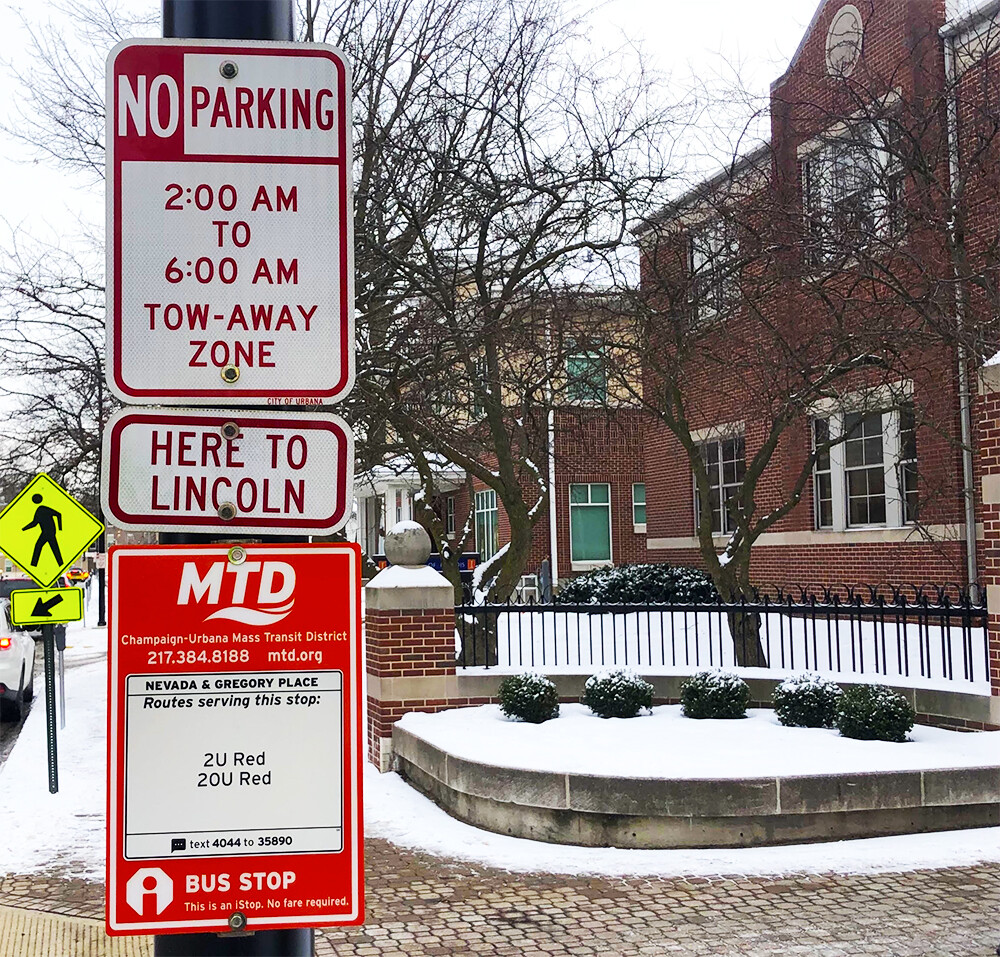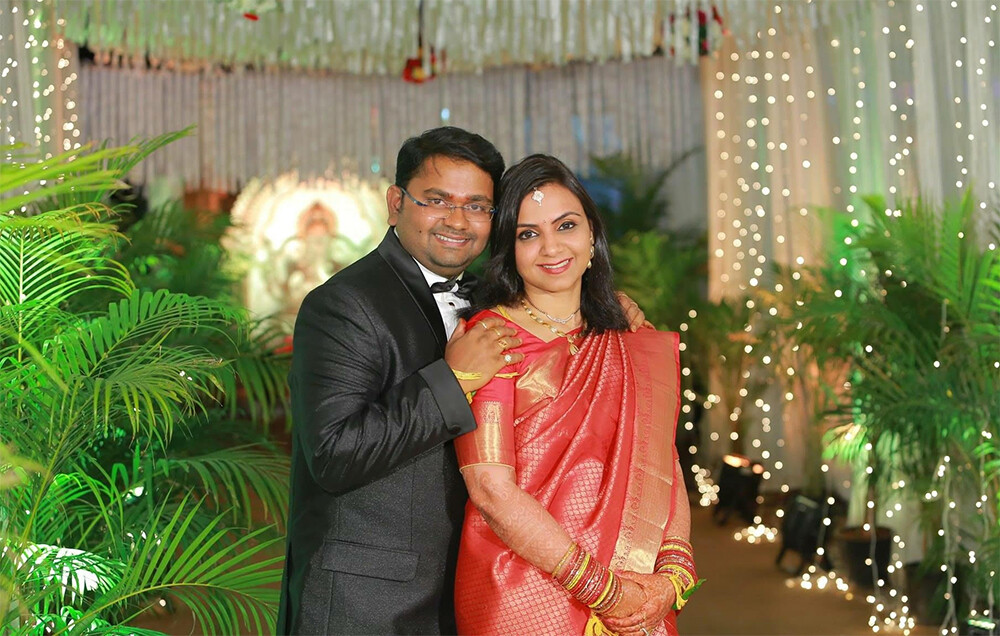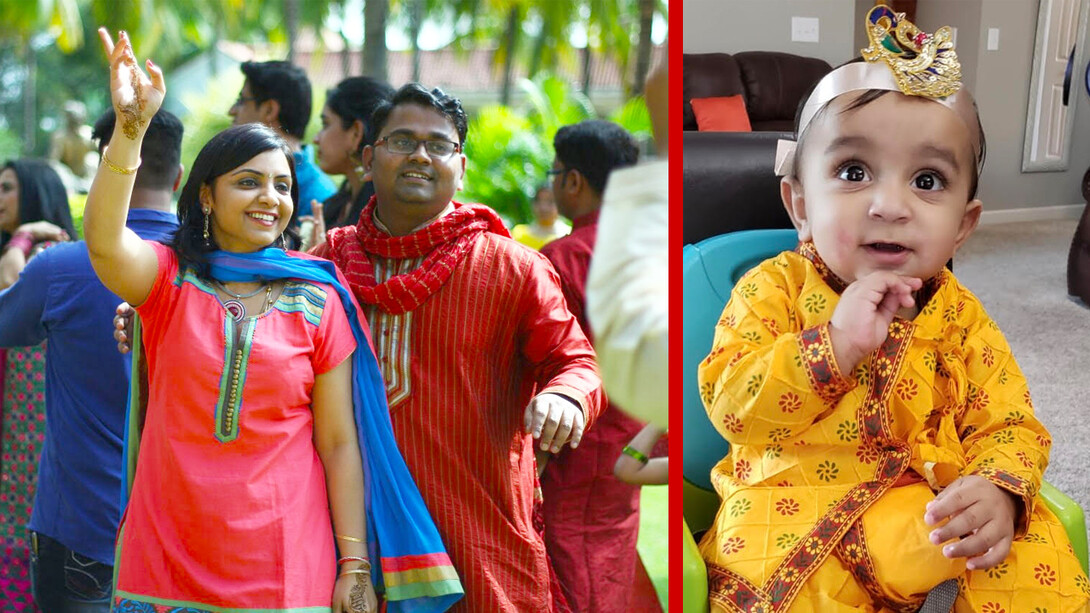
Welcome to Love Academically, a Nebraska Today series that snuggles up with the stories of Husker couples: how they met, how they wound up at Nebraska U, how they balance relationships with careers or studies at the university. Because love may be patient, kind and blind, but at the University of Nebraska–Lincoln, it’s also academic.

Dipti Dev felt like she should be popping some bubbly as she neared the end of her time at the University of Illinois at Urbana-Champaign. But doubts — maybe reasonable ones — were encroaching on her peace of mind.
It was July 2013, and the doctoral candidate in nutritional sciences had just received an offer to become an assistant professor of child, youth and family studies at the University of Nebraska–Lincoln. She was thrilled, awash in the joy and relief that anyone might feel at getting a job offer out of school, especially one in the fiercely competitive world of academia.
It was the lone job Dev had applied for, which actually troubled her doctoral adviser, who wondered whether she should at least consider other openings before jumping on this one. Dev respected her adviser, knew he only wanted the best for her. And so, as a natural, well-versed worrier, she immediately began to ruminate, deliberate, cogitate.
“I felt like I couldn’t talk to my parents about it, because they would not know the next best step,” Dev said. “They would just say, ‘You are our only child. Please come back to India now that you’re done with your Ph.D.’”
Needing time and space to think, she stepped out of her lab and into the summer air, the decision weighing even heavier than the humidity.
“I was walking, and I was looking at the sky, like, ‘God, what should I do? Please give me a sign.’ And as I was looking, I saw the sign,” she said, and not figuratively. “It was a bus stop sign that said, ‘Here to Lincoln.’
“I couldn’t have asked for a more direct, clear sign. I used to take the bus from my lab to go home, and my home bus stop was called Lincoln Square Mall. But I had never paid attention to that sign before.”

This time, Dev would heed it, accepting the position at Nebraska. Not long after, she found herself holding what would turn out to be a less obvious but no less important one: a brochure from the Institute of Agriculture and Natural Resources that featured the names and portraits of its incoming faculty. She might have a job, but she still needed an apartment. Maybe someone in the brochure, she thought, could recommend one.
Her eyes gravitated toward and settled on a friendly-looking mug belonging to her future husband.
“I looked at his picture and thought, ‘OK, he’s from India.’ (I figured) he would have the same mindset: not too expensive an apartment, very practical, close to the university and so forth,” she said.
The face belonged to Santosh Pitla, who replied to Dev’s email by suggesting the same apartment complex that her father, 8,000 miles away but ever-concerned for his daughter, had recommended after some internet research. When Dev flew to Lincoln for the first time to actually check out that apartment, Pitla offered to pick her up from the hotel and welcome her over dinner at Hiro 88.
“Oh, she was very focused,” said Pitla, who started at the university in October 2013. “She had all sorts of questions about faculty, the university — 95% of our first meeting was about work.”
Single-minded as she was, Dev made an early impression.
“‘Wow, she’s great,’” Pitla recalled thinking. “That’s what I thought, but I didn’t let her know that.”
And Dev would never have guessed, especially after a second dinner attended by several other new faculty.
“He completely ignored me,” she said.
“That was just her perception!” Pitla laughed. “She thought I was a little arrogant or something. (In retrospect,) I was like, ‘What?!’”
Dev’s perception would soften that December, when she officially moved to Lincoln — just as many of her new colleagues were leaving town or otherwise busy with the holidays.
“I didn’t really know anyone,” she said. “My flight got in late. My stuff was getting shipped from Illinois, so I was in an apartment without any furniture. That night, I was feeling really depressed.”
At that moment, her parents’ and adviser’s concerns might even have been rattling around her subconscious: You don’t eat beef. You don’t know anything about football. What will you do in Nebraska?
Just when she needed it most, there was Pitla, again, to lend an ear and a dinner invite.
“I thought he would order pizza,” Dev said. “But he actually cooked a homemade Indian meal for me. I was almost in tears. I had been feeling so low. I don’t think he realized it.”
“I was like, ‘Oh, my God. I just made you some food, that’s all,’” Pitla said, laughing. “She told me that she was the one who would always cook for others when she was in Illinois.”
Even then, the two saw each other strictly as colleagues and friends. Ironically, it was distance — an ocean of it — that brought them closer, when issues with his visa forced Pitla to return to India for four months in the first half of 2014.
“I realized, ‘Man, I miss her,’” Pitla said. “And she was missing me, too.”
They stayed in touch over Skype and, when Pitla got back to the States in July 2014, started dating.
“I was so comfortable with her,” he said. “It was like we’d known each other for a very long time. She was just so loving and affectionate. I could be myself.”
In Pitla, Dev saw a trait she had long since recognized in herself — a passion for work that went beyond interest in prestige or money, that was intrinsic but outwardly focused. In Pitla’s case, it was a passion for engineering autonomous robotics to assist a most human endeavor: agriculture. Pitla wanted to ease the burden, hone the precision and speed the process of collecting data in the fields. That, he believed, could reduce reliance on pesticides, maximize the efficiency of water and improve yields to feed a growing population.
“He genuinely wants to make a difference in the community. He wants to help people. So we would have, like, endless conversations about how we could solve the problems of the world,” Dev said with a smile. “I like that enthusiasm and positive energy of somebody who really has so many aspirations and dreams.
“I thought, ‘You know, when I have children, having somebody like this as a role model would be really big. The way he looks after his friends and his students, he’s so caring. If he’s that caring with his students and his friends, he will do everything for his family, too.’”

Once the two dipped their toes into a relationship, it wasn’t long before they took the plunge: Pitla proposed in November 2014, and the two wed at the Lancaster County courthouse in April 2015. They flew to India that December for the “big, lavish wedding” that both families had been eagerly awaiting.
Faculty commons
As a couple, and a couple of faculty, at that, Dev and Pitla said they can empathize and sympathize with each other in ways that only a fellow faculty member could. The packed, rollercoaster schedule. The deep-sea pressure to publish papers and earn grant funding. The millstone of the ever-looming milestone that is tenure. Both know them all, and all too well.
“If I have a grant proposal due in one week, she understands what that means,” Pitla said. “We are definitely on the same page.”
Still, Dev conceded that when her husband even momentarily closes the book containing that page, she often can’t help but crack it open again.
“If you ask Santosh, he would say that the biggest disadvantage of working with me is that wherever I find an opportunity, I will bring work in and talk to him about it. If it’s the weekend, and he’s watching TV, I’ll be like, ‘You’ve watched an hour of TV now. Why don’t you work on that grant?’ Or, it’ll be the middle of the night: ‘What do you think about this idea?’ So he definitely doesn’t appreciate that,” she joked. “But it’s really great to work with people you share such a great relationship with. The best work happens when you can bounce ideas off each other and not feel like you’re being judged.”
Maybe the best example of that came, fittingly, at the dinner table. The couple was in the midst of a fight. Silence was on the menu.
Let’s talk about work, Dev thought. That will be less awkward.
Dev, whose research focuses on getting children to eat more nutritious diets, had grown frustrated with trying to track how much of each dietary staple — fruits, veggies, whole grains, protein, dairy — children were consuming. The default method involved manually weighing each staple before and after the meal, a time-consuming and sometimes imprecise process. Did her husband have any thoughts?
Pitla, who works in the Department of Biological Systems Engineering, approached the problem like, well, an engineer: What about implanting each section of the plate with sensors?
Interesting, Dev thought. But how would we digitize the data?
Easy: a Raspberry Pi (the miniature CPU- and memory-containing circuit board, not the dessert).
And we could automatically upload the data to a hard drive or the cloud?
Sure. It’d be WiFi-enabled.
And if the internet was down at the school or child care center?
No problem. We could embed an SD card as a backup to avoid losing the data.
“So it just kept evolving,” Dev said. “I was always thinking about the practicality, and he was giving me technology solutions.”
The conversation ended their tiff, but it also led to a prototype of the SensiTray, which the couple is continuing to refine and is now in the process of patenting. Alongside an intuitive app developed by their colleagues, the couple sees the SensiTray as a potential centerpiece of dietary interventions that could help parents, pediatricians and schools combat childhood obesity.
The couple’s mutual support, personal and professional, also helped both Dev and Pitla earn tenure in 2019. Just two days before receiving and celebrating the good news with colleagues whom Dev described as “like family to us,” the couple received better: Dev was pregnant with their first child, a boy. His name? Dev Pitla, which Santosh conceived as a way of honoring both families.

Given all of that — all that a modest bus stop helped set in motion — Dev said she’ll ever remember and cherish the three little words that graced it: Here to Lincoln.
“I’m just so grateful for that moment, for that sign,” Dev said. “Looking back now, I think that’s the best decision I could have made: to come to Nebraska, to meet Santosh, to have a such a great platform to launch my career. I got everything that I could have wished for.”







